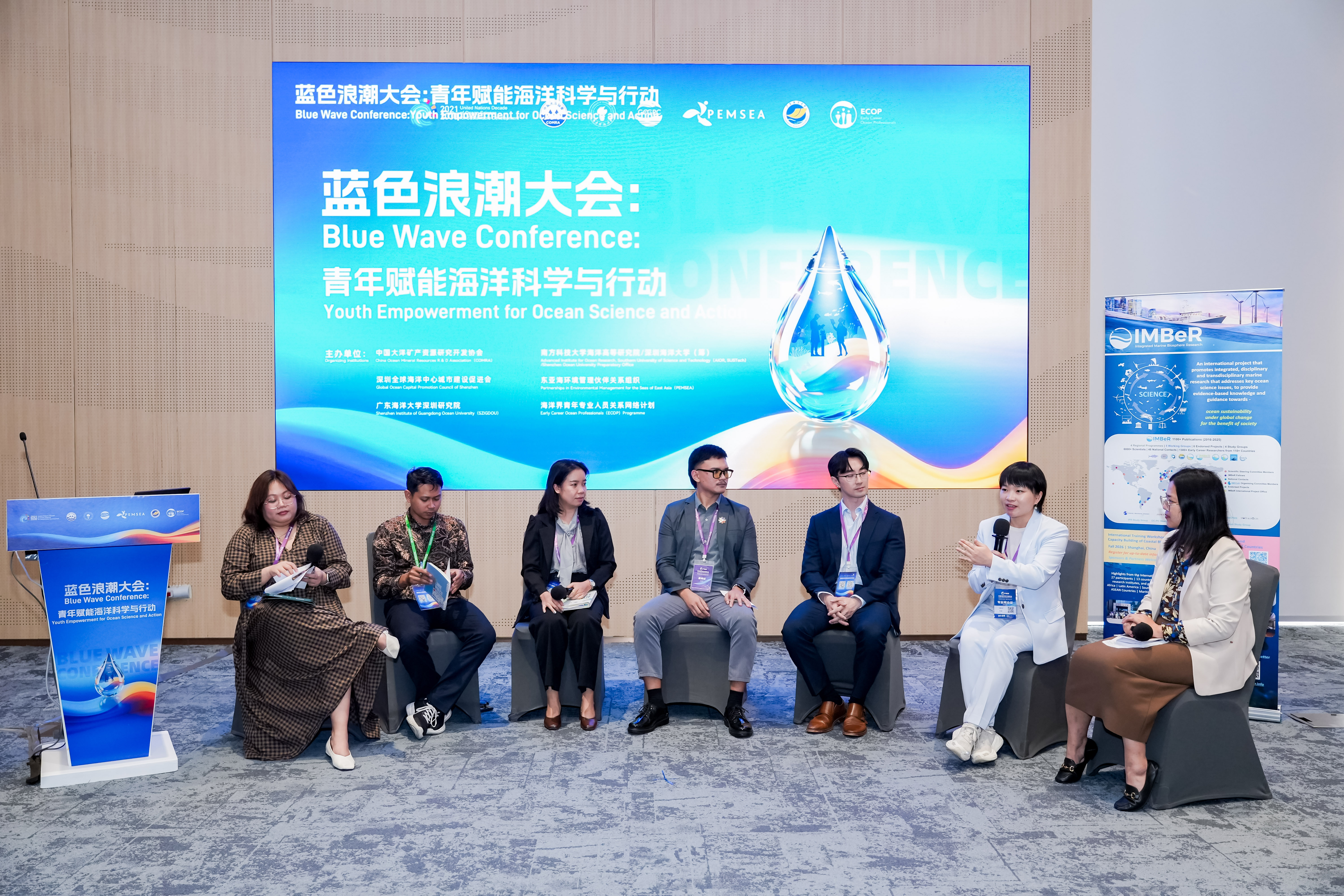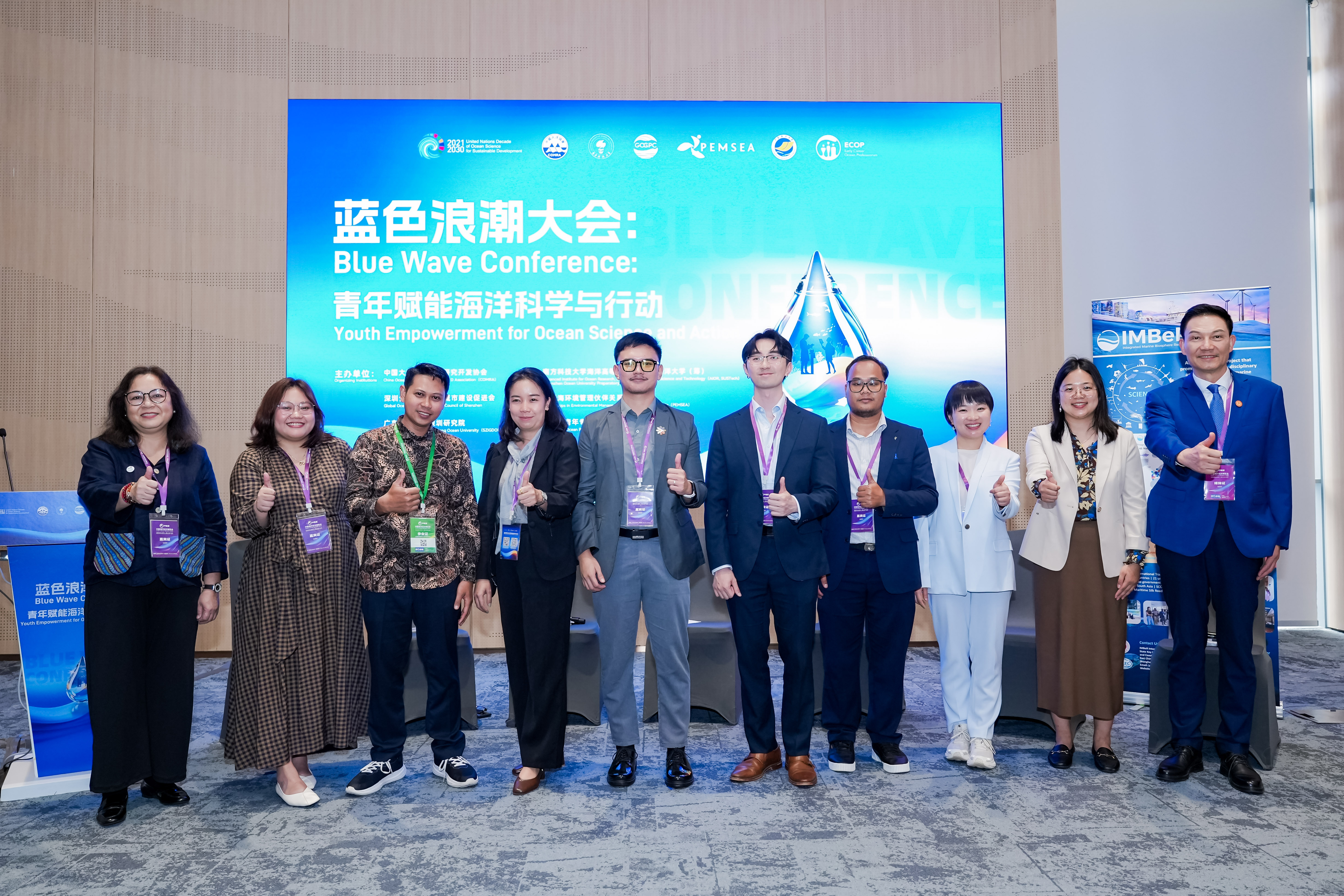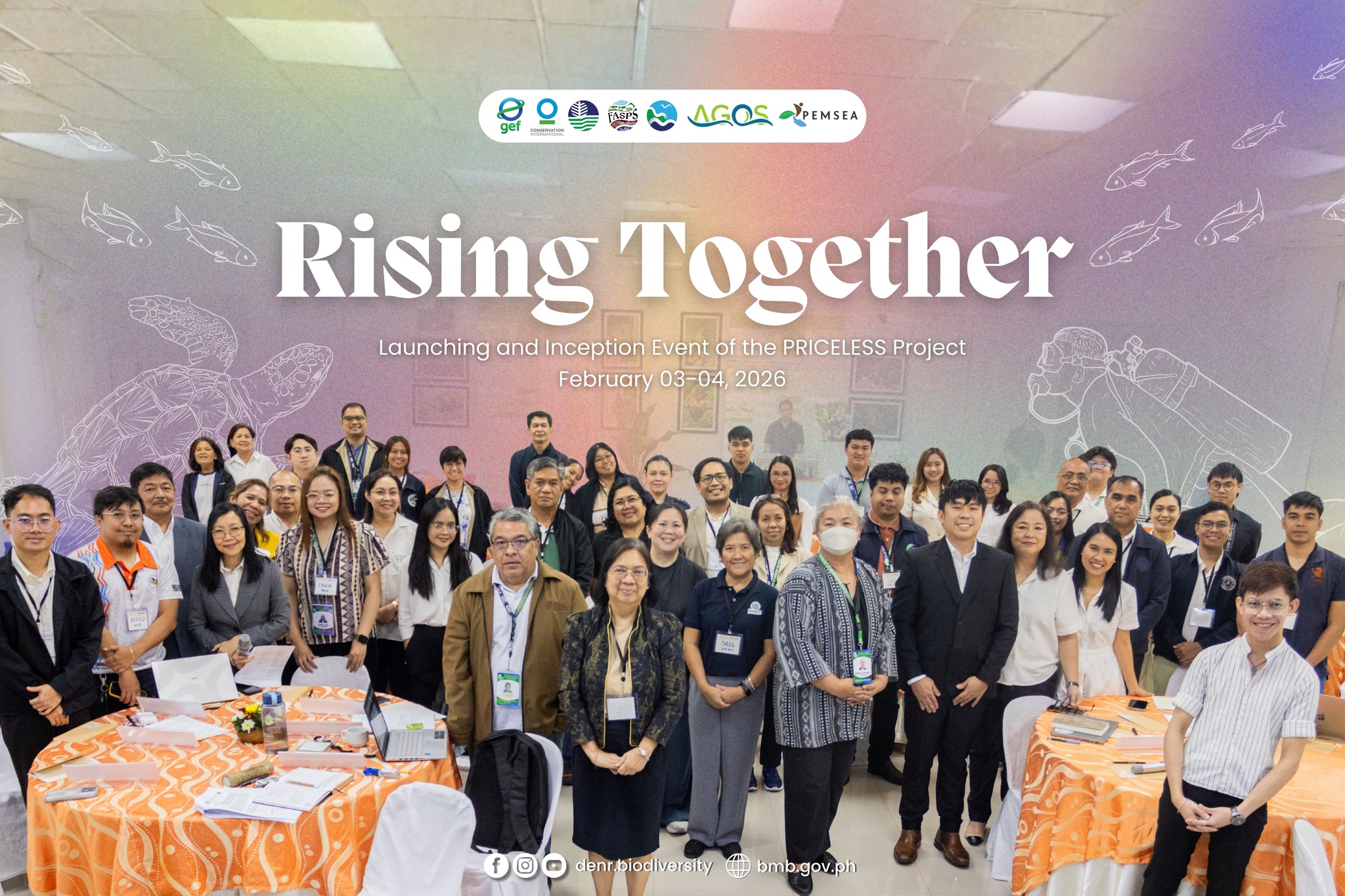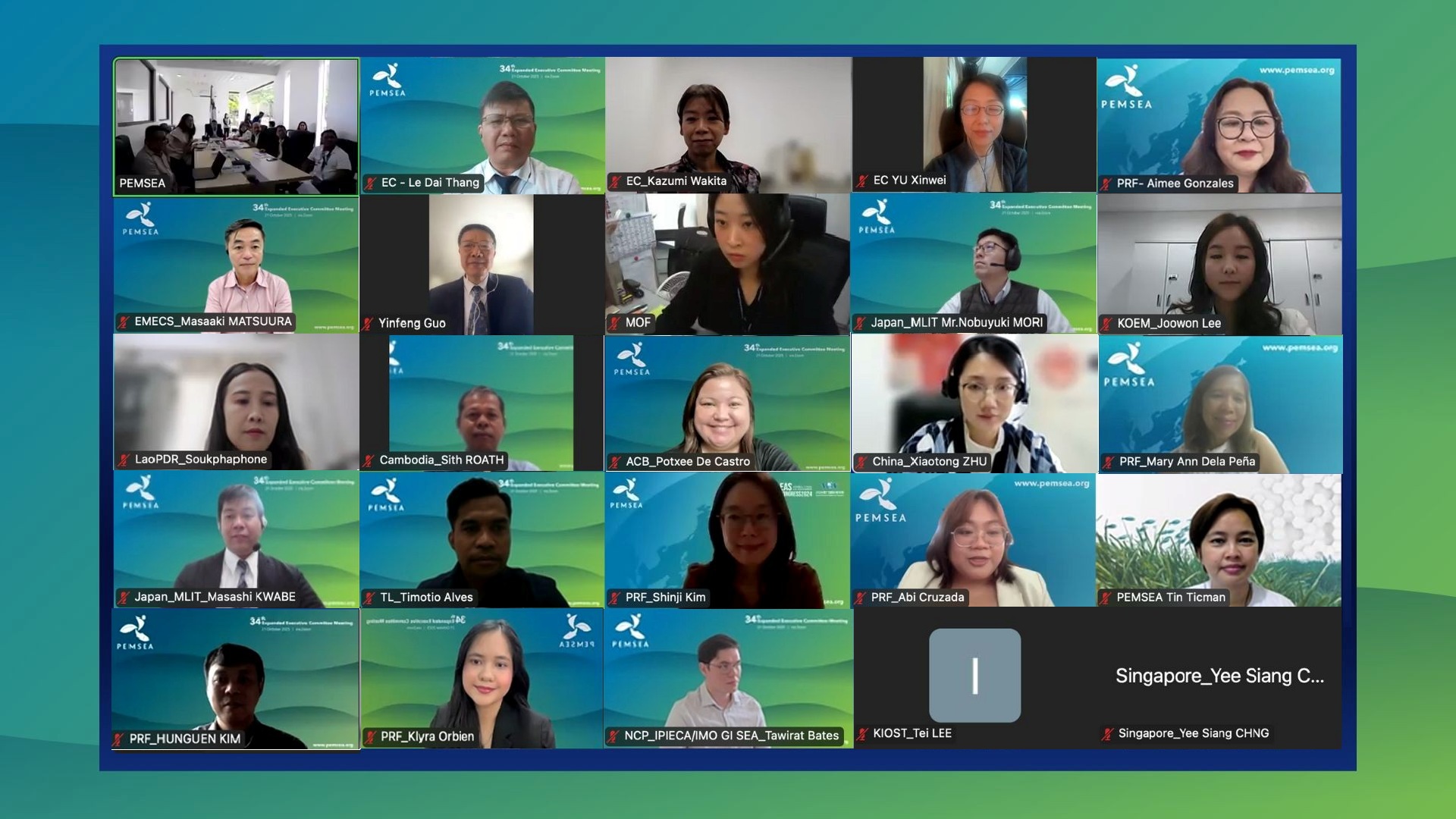Young Ocean Leaders Call for Stronger Support, Funding to Sustain Youth-led Marine Initiatives
Friday, 7 November 2025

Young ocean leaders from across the East Asian Seas (EAS) region called for greater access to funding and long-term institutional support to sustain youth-led marine conservation projects during the Rising Tides, Rising Leaders: Youth Science and Action for a Resilient Ocean forum organized by PEMSEA at the Blue Wave Conference held in Shenzhen, China on 30 October 2025.
The session gathered emerging ocean leaders working in ocean science, policy, and community-based marine programs, many of whom are already leading monitoring initiatives, conservation programs, and science communication efforts despite limited resources.
Aimee Gonzales, Executive Director of the PEMSEA Resource Facility (PRF), emphasized PEMSEA’s commitment to collaborative and inclusive ocean governance. “PEMSEA continues to provide platforms where the youth can learn, influence, and lead,” she said, citing the EAS Youth Forum and the PEMSEA Network of Young Leaders.
“We would like to learn how you are engaging with your communities, how you are advocating for sustainable practices, how you are applying ocean tools and solutions, and also how you share your results and recommendations to your target beneficiaries, to your governments,” she said.
Realities on the Ground

Across the EAS region, youth-led initiatives have grown more visible and impactful. However, nearly everyone in the panel described common barriers: funding constraints, gaps in technical capacity, and limited policy access.
Ahmad Rijayat, Research Fellow at IPB University in Indonesia, and conducts research on shark and ray conservation highlighted how insufficient data, often due to lack of research funding and field equipment creates barriers to policy change.
“It is challenging for scientists to collect, improve, and enhance our data. We need robust data to support our policy input for sustainability in fisheries management,” he said. He also noted limited funding and technical resources needed for capacity building.
Keomanivone Phouthakhanty, a technical officer at the Department of Water Resources Management in Laos, described capacity gaps in coastal monitoring.
She noted that the absence of a systematic water quality database makes it difficult to consolidate and access information across monitoring networks. Without centralized data, it is challenging for young practitioners to translate findings into concrete actions or implementation.
Leo Castro, Executive Director of Mangrove Matters PH in the Philippines, pointed to the financial instability of youth-led organizations. “A lot of youth organizations can really resonate with this challenge,” he said. “Even in grants, there are many instances where operational or professional fees are not covered. That’s the reality in youth-led initiatives.”
He emphasized that youth-led groups often have to choose between sustaining their own livelihood or continuing their community work, making institutional support and accessible funding essential for meaningful and lasting engagement.
“We always ask first if it’s okay to include our professional fees or compensation. If they say no, then we don’t proceed with the grant. That’s the reality in youth work and youth-led initiatives, especially in rural or coastal areas in the Philippines,” he said.
He added that institutions, NGOs, private organizations, and academia can play key roles in providing resources, mentorship, and capacity building. “I hope that in a few years from now, the youth will be seen as equal partners and are part of decision making,” he said.
Hailing from Singapore, Dr. Clarence Wei Hung Sim of Nanyang Technological University shared a contrasting, but rather positive context in his country where early-career researchers are increasingly being included in policy discussions.
He takes inspiration from students and youth-led volunteer groups across universities in Singapore who are taking a stand for the environment, bold and driven movements that spark inspiration among young people.
“Right now our government is actually very strongly engaged,” he said. “Even a young researcher like me has a voice.” He encouraged youth groups to work together. “As cliché as it sounds, there is power in numbers. If every group combines efforts, it will definitely capture media attention and therefore government attention.”
As climate pressures mount, the future of the ocean hangs in the balance, and for these young ocean leaders, bold action through learning exchange and collaboration is the way forward.
They believe that the future of the ocean rests in empowering the youth to remain active and engaged. He emphasized that young leaders themselves form a strong network of support, and through collective passion and collaboration, they can continue to advance their advocacies for coastal and ocean sustainability.
Abigail Cruzada, Secretariat Coordinator at PRF, reiterated that PEMSEA is currently exploring a more structured and collaborative approach to youth engagement. “We want to also see how we can integrate this in our regional mechanism and further strengthen capacity and support to include the youth in decision-making processes at the local national and regional levels".
“The insights from this conversation and discussions in previous youth fora organized by PEMSEA will help inform options and recommendations to strengthen the PEMSEA Network of Young Leaders as we move toward making it more structured, impactful and sustainable,” she added.

The Rising Tides, Rising Leaders forum forms part of PEMSEA’s ongoing work to provide opportunities for young leaders to share their ideas and solutions on sustainable coastal development in the East Asian Seas region.
Insights from the session will inform the strengthening of the PEMSEA Network of Young Leaders, including new pathways for collaboration, mentoring, and capacity development.
The 2025 Blue Wave Conference convenes young ocean scientists, innovators, and practitioners from around the world to support the UN Decade of Ocean Science for Sustainable Development (2021–2030) and outcomes of the Third UN Ocean Conference.
During the Conference, PEMSEA also signed a Letter of Cooperation with the Southern University of Science and Technology (SUSTech) through its Academy of Interdisciplinary Ocean Research for strengthened regional collaboration on sustainable ocean governance.
PEMSEA and SUSTech also laid out initial pilot activities, including collaborative work on ocean sustainability research, internship programs linking young scientists across East Asia, and the potential co-hosting of future regional ocean fora.




